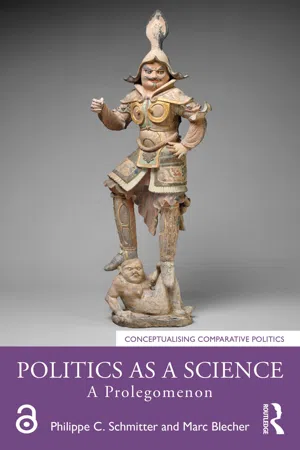
Politics as a Science
A Prolegomenon
Philippe C. Schmitter, Marc Blecher
- 138 Seiten
- English
- ePUB (handyfreundlich)
- Über iOS und Android verfügbar
Politics as a Science
A Prolegomenon
Philippe C. Schmitter, Marc Blecher
Über dieses Buch
In Politics as a Science, two of the world's leading authorities on Comparative Politics, Philippe C. Schmitter and Marc Blecher, provide a lively introduction to the concepts and framework to study and analyze politics.
Written with dexterity, concision and clarity, this short text makes no claim to being scientific. It contains no disprovable hypotheses, no original collection of evidence and no search for patterns of association. Instead, Schmitter and Blecher keep the text broadly conceptual and theoretical to convey their vision of the sprawling subject of politics. They map the process in which researchers try to specify the goal of the trip, some of the landmarks likely to be encountered en route and the boundaries that will circumscribe the effort. Examples, implications and elaborations are included in footnotes throughout the book.
Politics as a Science is an ideal introduction for anyone interested in, or studying, comparative politics.
"The Open Access version of this book, available at http://www.taylorfrancis.com/doi/view/10.4324/9781003032144, has been made available under a Creative Commons Attribution-Non Commercial-No Derivatives 4.0 license."
Häufig gestellte Fragen
Information
1
The Subject Matter
AbstractPolitics is a (if not the) quintessential human activity – the “master science” of the sphere within which all other human activities must take place. Its goal is to domesticate the inevitable conflicts that arise from our need to live together in communities under conditions of scarcity. This requires coordination, which, in turn, necessarily involves the controlled exercise of power. Politics involves the development of mutually agreed upon rules, norms, institutions and/or reliably applied practices that permit conflicts to be resolved pacifically to preclude the resort to violence. Yet, it also produces constant contestation, which makes politics inherently dynamic and always unbalanced. It also involves units that are not equivalent, and that are conscious and themselves transformed as they interact. They do so through highly imperfect processes of communication. Politics is also inherently historical, since humans are always affected by their experiences and institutions. For all these reasons, politics is a very different kind of realm from the natural world, with its predictable regularities and objective processes. So is the “science” that studies it. Thus, it would be appropriate to give the study of politics its own name that captures its uniqueness as a science: politology.
1.1 The Core: Power and Politics
(a) the process through which ordinary citizens unite their wills in the form of authority fields and constitute politically relevant actors (the politics of participation and collective action); (b) the process in which authority fields as politically relevant actors exchange support resources with factions of the elite competing for authority positions (the politics of support and pressure); and (c) the process in which these factions struggle among themselves for public authority (the politics of competition).
[T]here is a world of difference whether bindingness over others is applied via a direct utilisation of power/resources in dealings with other actors or whether compliance is stabilised over time and generalised to the entire membership of a system, including those against which no ‘power’ has been used and no conflict has been waged (p. 125).
Inhaltsverzeichnis
- Cover
- Half Title
- Series Page
- Title Page
- Copyright Page
- Dedication
- Table of Contents
- The Cover
- Preface and Acknowledgments
- 1 The Subject Matter
- 2 The Foundations
- 3 The Consequences
- 4 The Discipline
- 5 The Design of Research
- 6 The Purpose
- 7 The Promise
- References
- Index